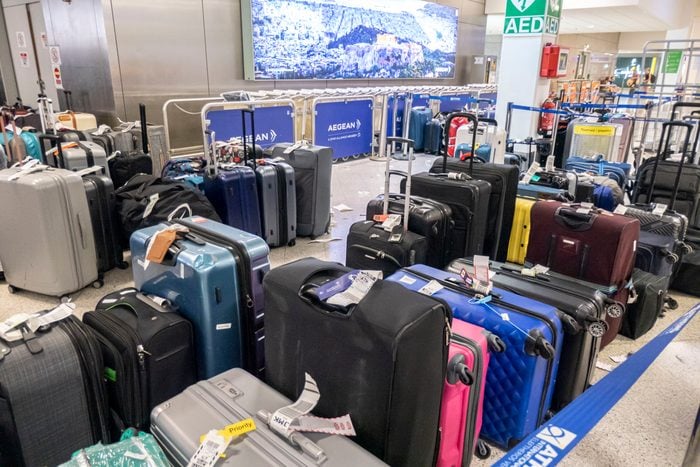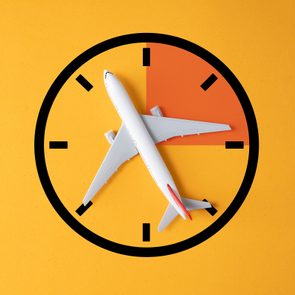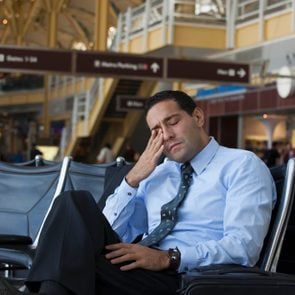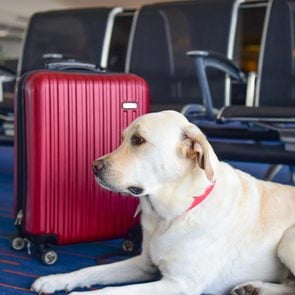How to Get Reimbursed If Your Luggage Is Lost, Damaged or Delayed
Updated: Feb. 15, 2023

If you’ve finally booked that long-anticipated trip post-COVID, you’re not alone. The demand for flights has soared by 79% over the past year, which is great news in some ways … but not others. Airlines have been struggling to keep up with travel demands, which has resulted in delayed and canceled flights, as well as a higher incidence of luggage getting delayed, damaged and lost. How bad is the lost-bag problem? According to the U.S. Department of Transportation (DOT), approximately .38 out of 100 bags were lost, damaged, delayed or stolen in May 2021 … and that number jumped to .56 per 100 bags in May 2022. That might not sound like a lot, but it translates to 400,000 bags. Don’t worry, though: We’re going to explain exactly how to get a lost luggage reimbursement—and, ideally, also find your bag—should this happen to you.
While you might not get your lost luggage by the end of a mini vacation, you could be partially compensated for your troubles and even be reimbursed for certain items you buy while you’re away, whether you’re dealing with budget airlines or major ones. If you didn’t realize this, chalk it up to the things airlines don’t tell you but you definitely should know. Once you’re up to speed, you’ll also want to learn how to get a refund for a canceled flight.
Do airlines have to compensate you for lost luggage?
Yes. The airline has to reimburse you for your bag and its contents up to the maximum liability amount set for domestic and international flights, though this is dependent on your claim, says Keri Baugh, a New England–based travel writer who runs the family travel blog Bon Voyage with Kids. You will also be reimbursed for any checked-bag fees. For domestic flights, the maximum liability amount is $3,800, according to DOT regulations, while it’s around $1,780 for international flights. Airlines may decide to reimburse you for more than this, but they aren’t required to do so.
Do airlines have to compensate you for delayed luggage?
Before we answer that question, we have a bit of good news: Airlines have sophisticated tracking systems, and whether they lose your luggage at one of the busiest airports in the world or a small one, they usually find it … eventually. That said, you should let them know that your luggage is missing by filing a claim with the airline ASAP.
In the meantime, the airline is required to compensate you for any incidental expenses you incur while you wait, such as toothpaste and a new bathing suit. (Remember to keep all your receipts!) The maximum liability for a damaged or delayed bag is $3,800 for a domestic flight; for international flights, it’s around $1,780. Yes, this is the same amount of reimbursement they offer for a lost bag, so don’t expect to receive all of it if your luggage is delayed or damaged. The reality is that the airline is likely to reimburse you for a few necessary items, but don’t go on a shopping spree.
How do I get a refund if my luggage is lost?
As soon as you realize your bag is missing, go to the baggage claim desk to file a claim. Put in a request for delivery to your home, hotel or airline, Baugh says. Also remember to request a baggage-fee refund and inquire about the policies for incidental compensation (if you need toiletries and other items until your bag or refund arrives). Many airlines will allow this after 24 hours.
Next, get the tracking number for your bag, go to your airline’s website and track your missing luggage until it’s safely in your possession. If it never arrives, contact the airline after a few days to inquire if it’s lost, and ask about claim filing procedures. Wait—didn’t you already file a claim? Yes, and now you have to file another one. Initially, your luggage was considered delayed, but now it’s officially lost. In this new claim, you’ll have to detail everything in the bag for reimbursement. If you have any receipts for the items you lost, definitely include them.
“Also, check your credit cards and travel insurance to see what additional benefits you might have,” Baugh says. You should also check your homeowners policy. For example, Visa, American Express Platinum and Mastercard will pay up to $3,000 per person per trip in lost luggage reimbursement (though just $2,000 for New York residents).
Keep receipts of any incidentals for reimbursement. If your bag does arrive, check it for damaged or missing items, and file another claim for damaged luggage with your specific airline, if necessary.
When should you expect to receive these funds? Prior to the pandemic, it took about 24 hours to get reimbursed, but now it takes about a week. If an airline isn’t working with you to resolve your issues, reach out to the Department of Transportation.
How long does it take to get lost luggage returned?
This depends on a number of factors, Baugh says. The first is how many airlines are involved; if you’re dealing with multiple airlines because of connecting flights, things could be trickier. Another factor involves the individual airline’s tracking mechanism. The better the tracking system, the faster they’ll be able to find your luggage.
The thing is, your bag could be anywhere: Maybe it never got on the flight, or maybe it was placed on the wrong plane. But most airlines consider your luggage to be officially lost—rather than delayed—between five and 14 days post-flight.
“I once flew two different airlines to Iceland, and my bag never arrived,” Baugh says. “I thought it was lost, but it turned out the first airline never connected it to the second airline.” Her luggage was eventually found, albeit after the trip ended. The airlines apparently didn’t speak with each other when trying to locate the luggage. In retrospect, Baugh says, she probably should have also contacted the first airline rather than just the second.
What’s the best way to prevent lost luggage?
The easiest way to prevent lost luggage is to skip checking your bags altogether and bring them as carry-ons. This is the smartest way to travel, if possible. But when you really do need to check your luggage, you can also minimize the potential for problems by booking the best flights to avoid cancellations, flying direct, labeling your luggage inside and outside in case the tag falls off, and using a Tile or an Apple Airtag so you can track your bags yourself.
Also, if the worst does happen and the airline loses your luggage, it won’t be quite as bad if you plan ahead: Before you check your bags, take pictures of the contents of your suitcase, as well as the outside of your bags. This way, you’ll be able to make your lost luggage reimbursement claims much easier, and the airline will be able to identify the lost bags.
Sources:
- International Air Transport Association: “Strong International Traffic Propels Continuing Air Travel Recovery”
- U.S. Department of Transportation: “Air Travel Consumer Report”
- Keri Baugh, a New England–based travel writer who runs the family travel blog Bon Voyage with Kids
- U.S. Department of Transportation: “Lost, Delayed, or Damaged Baggage”



